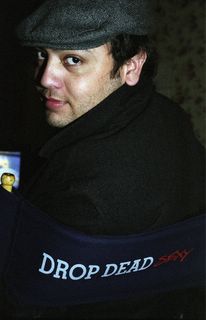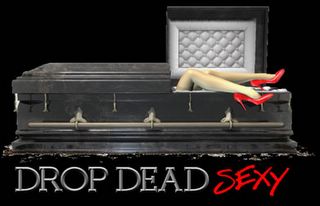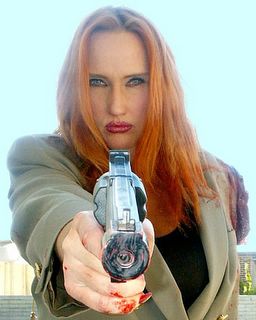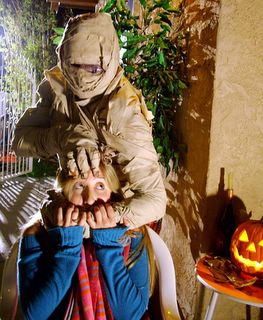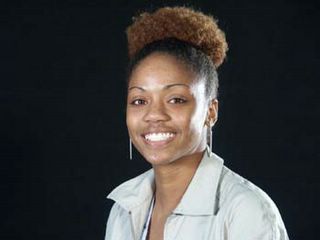
For those of you who have moved to Los Angeles to pursue a career in the entertainment business, can you remember your attitude when you stepped foot on that magical ground? Most likely, resonating from within you were the qualities of confidence, vision, passion, and determination. The case is no different with Filmmaker Kristal Burch. Thank you Kristal for reminding us of these essential qualities we must all possess to have a career in this business.
FS: Please take us back and share how you got started in film?
KB: I was always interested in the Art and Entertainment Industry. I use to do Ballet, Jazz, and Tap Dancing when I was a little girl. In my preteens, I started to model. When I got into high school I took many drama classes, I was a cheerleader, on the step team, a flag girl on the band, in pageants, fashion shows, talent shows, plays, musicals, etc... I was highly active.
Then one day, my junior year in high school, my father said the magical words, "Kristal, why be an actress when you can be the boss and make twice as much money and still act? Why not be a producer or a director?" That changed my life, from that point on, I did research and discovered North Carolina School of the Arts - School of Filmmaking in Winston-Salem, N.C. I filled out an application, wrote a paper, and I went through an interview. After all of that, I got accepted.
Basically the way NCSA operates is that, the first two years, they teach all the students how to do everything: Editing, Cinematography, Screenwriting, Directing, Producing, and Production Design. After the 2nd year, we are selected to go into a discipline. I was selected to go into Producing. At the same time, I realized my love for music videos (I've been watching them since I was 8yrs old) and I started to do independent music videos for local artists. So I graduated from college and decided to move to LA, so I can do Music Videos for Mainstream Artist.
FS: You made the bold decision to move to Los Angeles upon graduation to start your career. How tough a decision was this for you and what were the factors you had to deal with in making this decision?
KB: Oh my God, it was difficult. My mother didn't not want me to move to LA at first, because it is on the other side of the country from N.C. But after many conversations of how this is going to build my career, she was able to adapt. Unfortunately, my father passed away my sophomore year in college, so he wasn't there to support us and help us with this drastic change. But we kept his old and wise words in mind and knew that he would want me to go. Financially, it was tough, but at the moment I am maintaining. Still trying to get a Music Video gig. It's tough because it is so competitive, but that's life. I learned nothing comes easily, if it is good there is going to be a lot of work to get to it.
FS: You are a writer, director, and producer. Which of these facets of filmmaking do you enjoy the most? Why?
KB: I enjoy directing the most. Honestly, it is killing me that I can't direct right now. I am artistically hungry and ready to work. When I direct it is like a high. It is kind of funny because people that know me, they notice that I become a different person when I direct and usually they don't stand in my way. When I am working on a music video, I get so focused that I can't eat or sleep. It is Music Video, Music Video, Music Video! That's it. The funny thing about it, is that if I hurt my self I will keep going. The bitter-sweet thing about it is, I give my life to my art. My art is my soul.
FS: What has been the most challenging obstacle you have had to face thus far in your career?
KB: Matter of fact, you are asking the right question at the right time! The most challenging obstacle that I have faced is happening right now. It seems like the film industry is taking film school for granted. The reason why I say this, is because every gig that is related to a Music Video, I can't get hired. I think it is because I just got out of film school and they probably feel that I am not ready to handle the duties of a director or that I need to work my way up! But, I disagree! I spent four years of my life bettering my craft and I know that I am more than ready.
In other words, the most challenging obstacle is trying to get others to believe and trust in me, as much as I believe in my art. Once you can find someone in the film industry that believes in you and knows that you are talented, then you're in!
FS: What are some of your recently completed projects? In what capacity did you serve? Can we see these projects anywhere?
KB: The projects that I've done so far are "Work That", "Real Hood Souljahs", and "Child of God" Music Videos. The rap artist, Twiz Mack had submitted "Real Hood Souljahs" to Bet's UNCUT. I haven't seen it yet, but some of my friends had. I was the director, producer, and co-writer for that project. Another project I've done is a commercial for a book called, "Preacha Man". The author, Carl Kenney is in the process of getting it onto television in selected areas. I was the director, producer, and I wrote the commercial treatment.
FS: As you get settled into life in LA, what are your upcoming plans/projects? What are your career priorities heading into the next 6 months?
KB: My short term goal is to do music videos for Mainstream Artists. So I am going to harass the record labels (lol!). I already harassed most of the music video production companies here in LA. So I'm moving to Step 2. If that doesn't work, then I will better my reel and shoot local music videos for independent artists. I'm not worried. I'm going to make it by the end of this year.
Also, I am searching for a steady 9 to 5 job, you know, to pay the bills. At the same time I have a few documentary ideas that I want to pitch to certain executive producers. If that doesn't work, then I will do it myself, just like everything else.
My long term goal is to eventually write and direct feature length films.
FS: Being that you are beginning stages of launching your career, from your perspective, what does it take to make it in this business?
KB: From what I learned at NCSA and my experiences, determination is the key to success. Also, if no one helps you, that is okay, figure a plan to do it your self, basically independence. Most of the time, I didn't really have anyone to provide that helping hand, I had to do it myself. Another thing is to take risks and do other projects to get to where you want to be. Luckily, in the entertainment industry, everything is link together. (Music, Art, Filmmaking, Theatre, etc.)
Since I've been here in LA; I was in a fashion show in the Nollywood Film Festival. I might be on a Reality TV Show the ending of this month, and I am developing an Urban Documentary. So I am milking other things to get notice and get myself a Music Video gig. Which I will!









